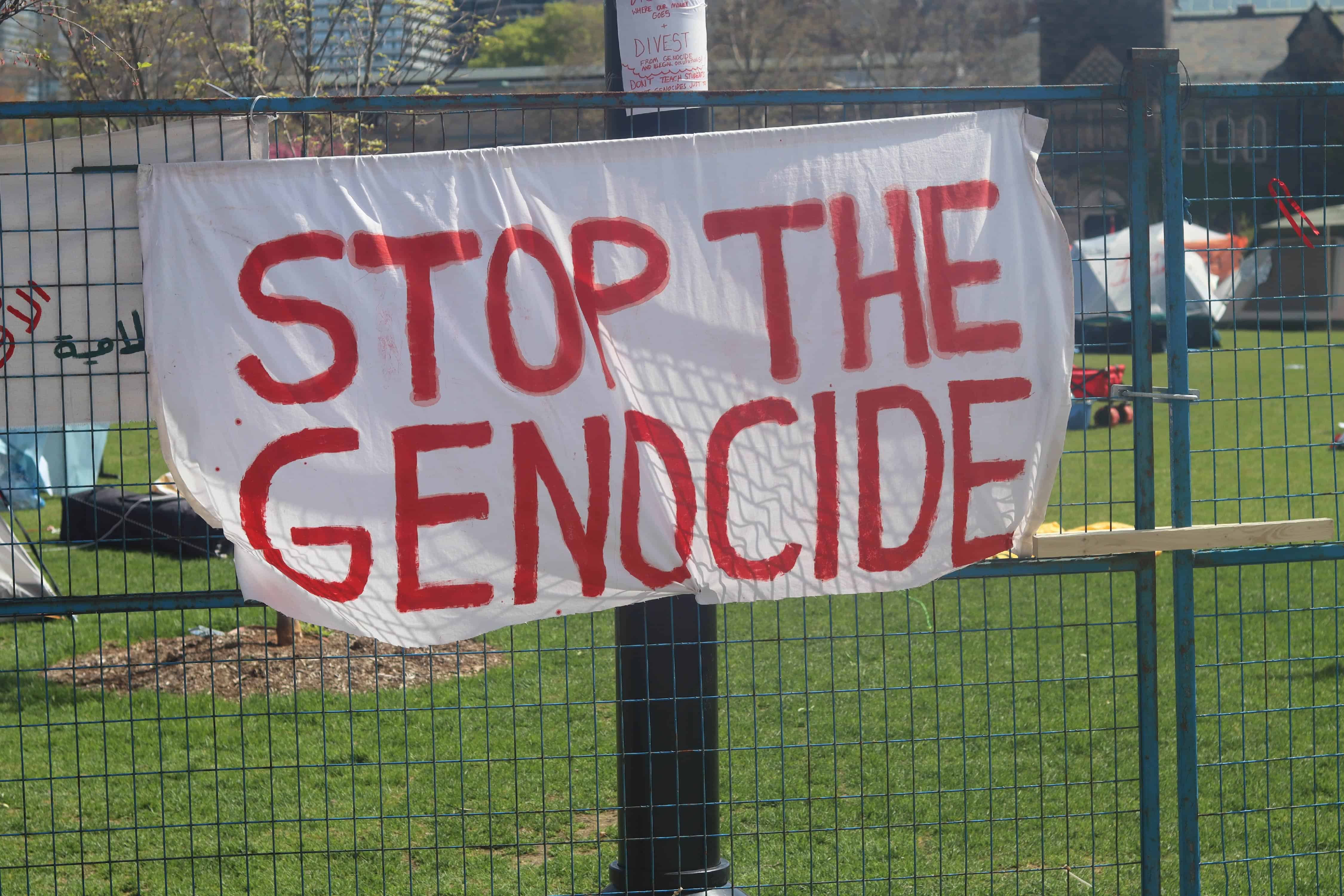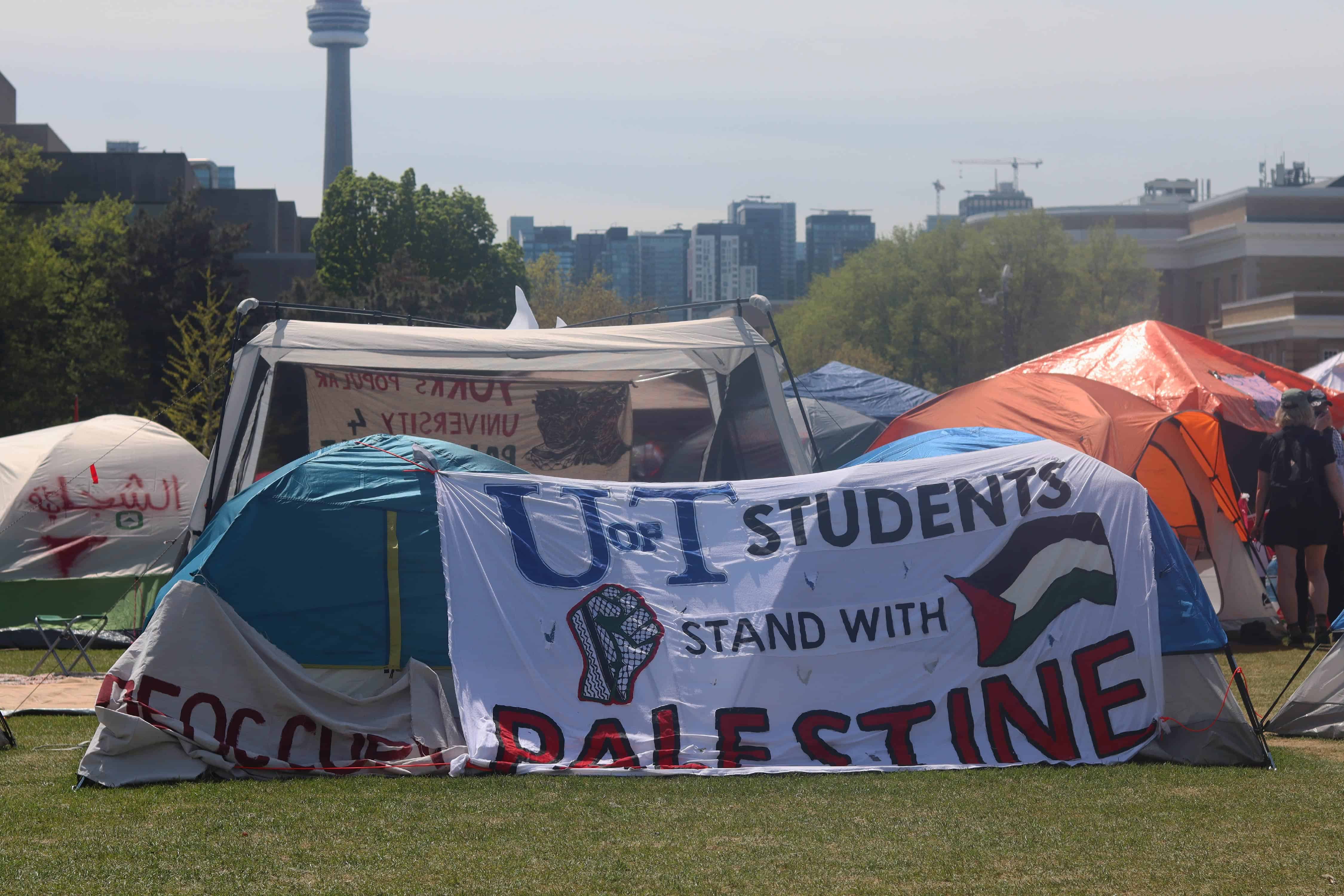The student encampment at U of T has entered its third week at King’s College Circle.
Student protesters from UofT Occupy for Palestine (O4P) — the encampment’s organizer — continue to call on the university to disclose its financial investments, divest its holdings from companies funding the Israeli military, and cut ties with Israeli academic institutions complicit in their government’s attacks on Gaza.
After a group of 50 students broke down part of the fence surrounding King’s College Circle and set up camp on May 2, the number of protesters within the gated area has gradually increased to 200 U of T students, faculty, and community members camping overnight.
Since the first day of the encampment, O4P student representatives have met with the university administration four times. The protesters within the encampment — which they refer to as the “People’s Circle for Palestine” — plan to stay put until the administration publicly commits to their demands.
Meeting with the administration
Within the first week of the encampment, O4P student representatives met with the administration twice. According to the students, the discussion was focused on “safety and sanitation concerns.”
Following the two meetings, O4P published an Instagram post on May 8, claiming that the university “refuses to discuss divestment.” The post noted that O4P would no longer talk to the university unless the administration directly addressed their demands.
On May 12, the students agreed to meet with the university to specifically discuss their demands. The next day, the students held a press conference outside the encampment.
O4P spokesperson Aviral Dhamija — a fourth-year student double-majoring in philosophy and international relations — told the press that they welcomed “the administration’s willingness to have a dialogue,” but called on the university to bring “something concrete” and “immediate.”
Kalliopé Anvar McCall — a fourth-year student in diaspora studies and another O4P spokesperson — also spoke at the press conference.
McCall noted that during the meeting with the university, the administration refused the students’ demands to cut ties with Israeli academic institutions. They claimed that the administration stated that “the university does not support academic boycotts,” although O4P claims that it had not called for this.
According to McCall, the student protesters are not asking the university for “a complete severance of connections” with all Israeli institutions, but specifically from those that “are physically located on illegal settlements or the ones that directly sustain this genocide.”
McCall also claimed that the university said cutting ties with Israeli schools would harm Israeli academics who are “the most vociferous critics of the Israeli government.”
In response to the university, O4P wrote in an Instagram post on May 13 that Palestinian scholars are the most critical of the Israeli government. In the post, O4P also claimed that “partnerships between Israeli Universities and U of T have increased during the genocide.”
O4P outlined three demands in the post as well, calling on the administration to retract statements they made on hate speech, health, and safety that “defame” their movement, provide a written commitment guaranteeing that the police will not remove protesters, and remove all police surveillance.
In an email to the student body on May 13, Vice-President, Communications Christine Szustaczek wrote that the administration is “choosing not to share details at this time, in order to enable dialogue,” regarding their May 12 meeting with the student protesters.
“Our actions are guided by our foundational commitment to the right to protest and freedom of expression, within the limits of University policies and the law,” wrote Szustaczek. She noted that the university continues to work toward a “peaceful resolution.”
Students express dissatisfaction over university’s proposals
Student protesters met with the university again on May 15.
O4P spokesperson Erin Mackey — a fifth-year student studying political science and environmental studies — told The Varsity that the university responded to their demands for divestment in the meeting, with a proposal to create a committee “to look into divestment.”
Yet, she said that the student protesters were “not optimistic” about the administration’s proposal.
Mackey explained that in 2016, the university rejected recommendations from a similar advisory committee to divest from fossil fuels. Although the university later committed to divestment from fossil fuels in 2021, she noted that “there’s an active and ongoing genocide, we don’t have time to wait multiple years to go through committees.”

OLYA FEDOSSENKO/THEVARSITY
In response to O4P’s demand to cut ties with Israeli academic institutions, Mackey claimed that the university instead proposed to create two endowed chairs for Palestinian studies at U of T. The student representatives countered this proposal, demanding an entire institute for Palestinian studies.
On May 16, O4P wrote in an Instagram post that the administration is making “marginal movement[s],” which would not appease them.
The post claimed that the university proposed a “6+ month timeline” to investigate divestment, and an “interlinked process” for disclosing financial holdings and divestment.
“A genocide is unfolding this very moment, and U of T is trying to stall until we pack up and leave,” the post read. “If U of T wants us gone, they must simply meet our demands.”
On the same day, Szustaczek sent out another email to students regarding the administration’s May 15 meeting with the protesters. She noted that, “the discussion was constructive and productive” with the meeting focusing on the students’ demands.
According to Szustaczek, the university’s goal remains the same, “to find a peaceful and sustainable conclusion to the encampment on Front Campus as soon as possible, in line with University principles and policies.”
Continued calls against the administration
On May 21, O4P released a petition addressed to President Meric Gertler and the U of T Governing Council, calling on them to “immediately commit to their demands.”
The petition noted that meeting the students’ demands is “crucial for aligning the University’s operations with its declared mission of supporting human rights, equality, equity, and justice.”
As of May 22, the petition has received over 700 signatures from U of T students, faculty, alumni, and supporters.
The Varsity reached out to the university for comment, but did not hear back in time for publication.


